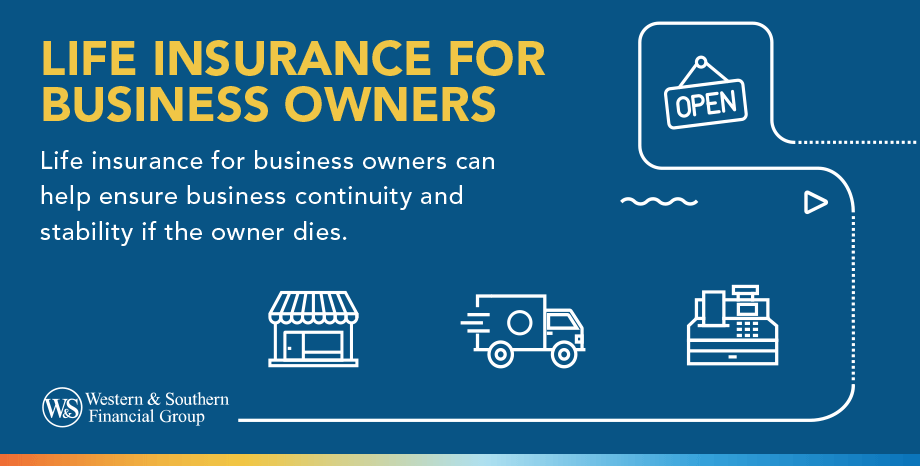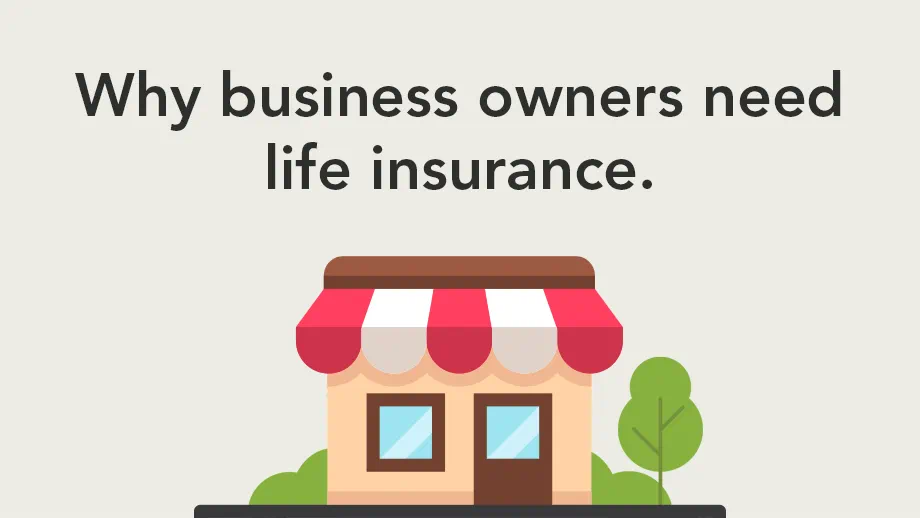Video Transcript
What happens to your business if you're suddenly not around to run it? For business owners, life insurance isn’t just a personal safeguard—it’s a critical business tool. Life insurance is often seen as a personal financial product—but for business owners, but it is much more. It protects your business from financial disruption if the unexpected happens. That means covering debts, paying bills, and ensuring the company stays afloat during a transition period.
Need funding for business loans? Many lenders require life insurance as collateral. It guarantees the loan will be repaid if you pass away. Plus, it shows investors you’re serious about risk management and continuity planning.
Also consider Key Person Insurance. If your company relies heavily on a few critical people—like a co-founder or top salesperson key person insurance can fill the gap. It provides funds to recruit and train replacements and stabilize operations during a difficult time.
What happens if a partner dies? Smooth Succession Planning is key to businesses. Life insurance can fund a buy-sell agreement, allowing surviving partners to buy out the deceased’s share without financial strain. It’s one of the most effective ways to ensure business continuity.
Your business might be your legacy, but what about your family? Life insurance ensures they’re not left with the burden of debt or the tough choice of selling the business under pressure.
How do you choose the right life insurance for your business. You’ve got options: Term life is an affordable and ideal for short-term needs. Whole life insurance provides more permanent coverage and has a cash value component. Universal life has flexible premiums and long-term growth. And lastly, invest in key person insurance coverage which protects the company directly.
To recap, don’t underestimate how much coverage you need and don’t assume your personal life insurance is enough. Always policies for the business and then personal policies. Revisit your coverage regularly as your business grows to make sure your policy aligns with your business’s succession and tax planning strategies.
Life insurance can be a smart business move as well, helping to protect your company, your employees, your partners, and your family. Don’t leave your business vulnerable.
Key Takeaways
- Life insurance for business owners offers a financial safety net, covering debts and operational costs to ensure business continuity if the owner dies.
- Lenders often require life insurance as collateral for business loans to ensure repayment if the business owner dies unexpectedly.
- Life insurance funds the buyout of a deceased owner's shares, ensuring a smooth and financially strain-free business succession.
- Key person insurance helps a business by covering the costs of replacing a vital employee and offsetting lost revenue if they die.
- Life insurance ensures the owner's loved ones are financially secure, providing stability even if the business faces challenges after their death.
Why Do Business Owners Need Life Insurance?
Life insurance is often considered essential for individuals, but it takes on an even greater significance for business owners. Here are several reasons why life insurance is a crucial tool for business owners:
- Protecting the Business: As a business owner, life insurance provides a financial safety net for your company in case something happens to you. The proceeds can cover debts and bills and keep the business running during a transition.
- Securing Business Loans: Banks and financial institutions often require business owners to have life insurance when applying for loans to ensure the loan will be repaid if the owner passes away unexpectedly. Life insurance also demonstrates financial responsibility to potential investors and partners.
- Ensuring Continuity for Key Employees: Key person insurance protects businesses from losing critical employees, such as top executives or specialists. If a key employee dies, the insurance provides funds to cover the costs of finding and training a replacement and offsets lost revenue.
- Facilitating Business Succession: Life insurance is crucial for business succession planning. It provides funds to buy out a deceased business owner's shares and ensures a smooth ownership transition without financial strain.
- Help Providing for Loved Ones: Life insurance helps ensure that your loved ones are cared for, providing them with financial security even if the business faces challenges after your death.
- Supporting Business Buy-Sell Agreements: A buy-sell agreement outlines what happens if a business partner dies or leaves. Life insurance can fund these agreements, ensuring surviving partners can buy out the deceased partner’s share without straining the company's finances.
- Maintaining Business Value: A business owner's sudden death can cause uncertainty and instability, reducing the business's value. Life insurance provides funds to stabilize the company, preserving its value for future sale or ownership transition.
Life insurance is a vital tool for business owners. It protects the business and its employees and ensures that personal and family financial goals are met. By incorporating life insurance into your business planning, you can help secure a stable and prosperous future for your company and your loved ones.


Types of Life Insurance Policies for Business Owners
As a business owner, securing your company’s future is as important as running it. Life insurance can be a crucial part of your business planning. Here's a rundown of the main types of life insurance policies that can benefit business owners.
- Term Life Insurance: Term life insurance is simple and affordable, offering coverage for 10, 20, or 30 years. If you pass away during the term, your beneficiaries receive a death benefit. It's ideal for covering business loans or providing income during crucial growth periods. However, the policy ends with no payout if you outlive the term.
- Whole Life Insurance: Whole life insurance offers lifelong coverage and includes a cash value savings component. While premiums are higher than term life insurance, part of the premium builds cash value over time. This policy provides insurance protection and a savings element that can be borrowed against business needs.
- Universal Life Insurance: Universal life insurance is like whole life insurance but more flexible. You can adjust premiums and death benefits over time. It includes a cash value component that earns interest, making it ideal for business owners who want permanent coverage that can adapt as their business evolves.
- Key Person Insurance: Protect your business if a vital employee or partner dies. The company owns the policy, pays the premiums, and is the beneficiary. The death benefit can cover financial loss, recruit and train a replacement, or provide a cushion during the transition.
Consulting with an insurance or financial professional can help you navigate the options and choose a policy that best protects your business and provides for your loved ones. Remember, the right life insurance policy can help offer stability and security, ensuring your business thrives despite unforeseen events.
Benefits of Life Insurance for Business Owners
For business owners, it plays a crucial role in securing the future of their companies. Here's why life insurance can be a smart move for anyone running a business:
Protecting Your Family and Business
As a business owner, you might have personal and professional assets intertwined. Life insurance ensures that your loved ones won't have to sell parts of the business to cover expenses or debts if something happens to you. It provides financial stability, helps your family maintain their standard of living, and ensures that the industry continues operating smoothly.
Funding Buy-Sell Agreements
If you have business partners, a buy-sell agreement funded by life insurance can be invaluable. This agreement is a contract where the remaining partners agree to buy out the deceased partner's share of the business. The life insurance policy provides the necessary funds to complete the buyout, ensuring a seamless transition and preventing disruptions.
Covering Key Person Losses
Every business has critical employees whose skills and knowledge are vital to success. If a key person passes away unexpectedly, it can significantly impact the industry. Life insurance for critical employees provides the business with funds to cover the costs of finding and training a replacement, helping to maintain operations during a difficult time.
Business Loan Security
When taking out business loans, lenders often require collateral to secure the loan. Life insurance can serve as collateral, reassuring lenders that their money is protected. If something happens to you, the insurance payout can cover the outstanding loan, preventing your family and business from being burdened with debt.
Tax Advantages
Life insurance policies come with various tax benefits. The death benefit paid out to beneficiaries is usually tax-free. Additionally, specific policies accumulate cash value over time, which can be borrowed against or withdrawn, often with favorable tax treatment. This can provide a valuable financial resource during your lifetime.
Attracting and Retaining Employees
Offering life insurance as part of an employee benefits package can help attract and retain top talent. Employees appreciate the added security of knowing their families will be financially protected. This can set your business apart in a competitive job market and foster loyalty among your team.
Estate Planning
Estate planning is a crucial consideration for business owners. Life insurance can help ensure that your estate has sufficient liquidity to cover taxes, legal fees, and other expenses. This can prevent the forced sale of business assets and ensure that your business and personal estates are handled according to your wishes.
Providing Financial Flexibility
Many life insurance policies offer features like cash value accumulation, which can be accessed through loans or withdrawals. This can provide additional financial flexibility to invest in your business, cover emergencies, or plan for retirement.
Life insurance is a versatile tool for business owners, that can help offer protection, financial stability, and peace of mind. Whether you're looking to safeguard your family's future, secure business continuity, or enhance employee benefits, life insurance can be a crucial part of your financial strategy.
Help secure your business's future. Get a Free Life Insurance Quote
Potential Drawbacks for Life Insurance for Business Owners
Life insurance can protect the business, provide for loved ones, and even ensure the company's future in case of the unexpected. However, it’s not all benefits. There are some potential drawbacks that business owners should be aware of before committing to a policy.
Cost Concerns
Life insurance can be expensive, especially for policies with high coverage amounts. For small business owners, this cost might be a significant burden on their finances. Premiums for term life insurance might be manageable, but whole life or universal life insurance can be costly due to their investment components.
Complexity and Confusion
Life insurance policies can be complex, especially for business owners. They must understand their options and how they apply to their needs. Working with a knowledgeable advisor is essential, but finding someone trustworthy and competent can be challenging.
Cash Flow Impact
Paying for life insurance premiums requires consistent cash flow. Maintaining these payments might be difficult for businesses that need to be stable or seasonal. Missing payments can result in a policy lapse, rendering the insurance useless when needed the most.
Potential for Over-Insurance
Sometimes, business owners might become over-insured due to aggressive sales tactics by insurance agents. This means paying for more coverage unnecessarily ties up funds that could be used elsewhere in the business.
Dependency Risks
Relying solely on life insurance for business succession planning can pose risks. The business may face unexpected financial challenges if the policy underperforms or tax laws change. A diversified succession plan that doesn't rely solely on life insurance is essential.
Opportunity Costs
The money spent on life insurance premiums could be used for other investments that yield higher returns or directly contribute to business growth. Business owners need to weigh the opportunity cost of investing in life insurance against other potential uses of their capital.
Tax Implications
Life insurance benefits are generally tax-free, but the premiums are not tax-deductible for individuals. However, specific life insurance policies may have different business tax treatments for particular purposes. Understanding the tax implications is critical for the company's overall financial strategy.
Risk of Policy Changes
Life insurance policies can change. Premiums might increase, or the insurer might alter the terms. This uncertainty can make long-term planning difficult for business owners who need stable and predictable financial products.
Life insurance can be valuable for business owners but has drawbacks. To make an informed decision, thoroughly research policies and consult a financial advisor working with business owners.
How to Choose the Right Policy
Whether you're a sole proprietor, a partner, or a corporation owner, choosing the right life insurance policy can safeguard your business and ensure its continuity. Here are steps to help business owners make an informed decision.
- Assess Your Needs: Could you determine the purpose of the life insurance? Are you looking to protect your family, business, or both? Calculate your coverage by considering debts, operational costs, and future earnings.
- Evaluate Policy Types:
- For Temporary Needs: If you need coverage for a certain period, like until a business loan is paid off, term life insurance might be the best choice.
- For Permanent Protection: If you want a policy that builds cash value and provides lifelong coverage, consider a permanent life insurance policy.
- Compare Quotes: Get quotes from multiple insurers to find a policy that fits your budget and needs. Please read the fine print regarding premiums, benefits, and exclusions.
- Consider the Insurer's Reputation: Choose a reputable insurance company with a solid financial rating. This ensures that the company will be around to pay out claims when needed.
- Consult with Professionals: Speak with a financial advisor or insurance broker who understands the complexities of business ownership. They can offer tailored advice and help you navigate the various options.
As a business owner, choosing the right life insurance policy involves careful consideration of your personal and business needs to secure your business future and provide a safety net for your loved ones.
Common Mistakes to Avoid
Avoiding these pitfalls can help you make better decisions for your company's future and your family's security. Here are some critical mistakes to watch out for:
- Underestimating Coverage Needs: A major mistake is underestimating needed coverage. Business owners should ensure life insurance covers personal expenses, business debts, key employee salaries, and replacement costs.
- Focusing Solely on Price: Consider the policy's terms, the insurer's reputation, and your business needs. Sometimes, a more comprehensive, pricier policy is worth it.
- Not Considering Key Person Life Insurance: Critical person insurance is essential for businesses reliant on key individuals. It provides funds to cover expenses and ensure survival if a key person dies.
- Ignoring Tax Implications: Life insurance can affect taxes for business owners; premiums might be deductible, and benefits could be taxable. Consult a tax advisor to understand the implications.
- Failing to Review and Update Policies: As your business grows, your insurance needs change. Many owners forget to update their policies. Regularly review and update your policy, especially if you've taken new loans, expanded operations, or experienced significant personal changes.
- Overlooking the Importance of a Buy-Sell Agreement: A life-insured buy-sell agreement is essential for business partners. It enables remaining partners to buy out a deceased partner's share without financial strain, preventing serious financial challenges or collapse.
- Relying on Personal Policies for Business Needs: Avoid using personal life insurance for business needs. Business life insurance is tailored to cover business debts and ensure continuity. Keep personal and business insurance separate for adequate coverage.
- Choosing the Wrong Type of Policy: Many life insurance policies, such as term, whole, and universal, each have pros and cons. Term life is cheaper but temporary; whole life is costlier, offers lifelong coverage, and builds cash value. Assess your needs before choosing.
- Neglecting to Include Disability Insurance: While life insurance is crucial, don't overlook disability insurance, which provides income if illness or injury prevents you from running your business. It's critical to comprehensive risk management.
By avoiding these common mistakes, business owners can ensure they have the right life insurance coverage to protect their interests. Remember, the goal is to secure your business's future and provide for your loved ones, no matter what happens.
Conclusion
Life insurance is not just a safety net; it's a strategic tool for ensuring the longevity and stability of your business. Don't wait for a crisis to strike. Act now to secure the right life insurance policy, protect your business, and provide for your loved ones. Contact a financial advisor to explore your options and take the following proactive step toward safeguarding your future.
Lock in business continuity with life insurance for business owners. Get a Free Life Insurance Quote
Frequently Asked Questions
What is the difference between personal and business life insurance?
Personal life insurance is designed to provide financial support to your family or designated beneficiaries if you pass away. On the other hand, business life insurance protects a company by covering key employees or providing funds to manage ownership changes after a partner's death.
How does corporate-owned life insurance work?
Corporate-owned life insurance (COLI) is a policy a company takes out on its employees, usually top executives. The company pays the premiums and is the beneficiary, using the policy's proceeds to cover costs like benefits, loans, or deferred compensation. This can help the company manage financial risks and secure long-term health.
Do I need life insurance if I own a business?
If you own a business, life insurance can be crucial to protect your company and your loved ones. It ensures that your business can continue to operate smoothly and that any outstanding debts or obligations are covered if something happens to you.


































